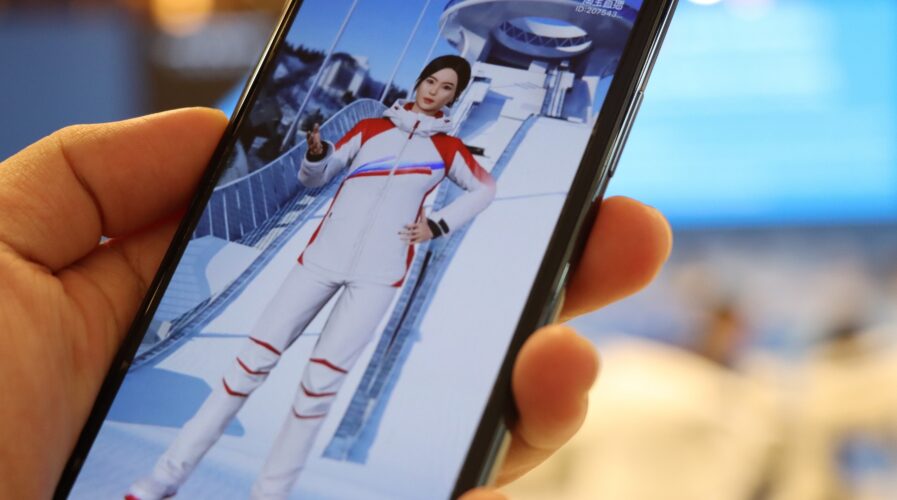
(source – Alibaba)
Virtual Influencer Dong Dong going for gold at the Olympic Winter Games
The Olympic Winter Games in Beijing now has a virtual influencer. Dong Dong may not be taking part in any of the sporting events but has been making the headlines around the world. The advanced digital persona created by Alibaba to engage with fans brings the possibilities of cloud-based innovation closer to consumers.
While Mark Zuckerberg’s metaverse dream tries to make a comeback, for now, all the attention is on the outspoken Beijing-born 22-year-old virtual influencer who loves winter sports. Developed by Alibaba DAMO Academy, Alibaba Group’s global research initiative, Dong Dong connects with Olympic fans, especially the younger, tech-savvy generation.
With her authentic human-like features, Dong Dong sparkles in personality, as well as her specialty to interact with audiences engagingly. Apart from promoting Olympic merchandise, the virtual influencer can also respond to questions in a lively, natural human voice with different emotions, along with various body gestures from giving a thumbs-up to posting heart-shape gestures and wiping away tears of disappointment.
In addition, she can perform live talk shows to introduce Olympic fun facts to the audience, and show off her enthusiastic, upbeat dance moves to accompany the Olympic theme songs to cheer for the Olympians. All these engaging interactions are powered by cloud-based digital technologies.
According to Xiaolong Li, Leader of Alibaba Virtual Human & Intelligent Customer Service, “Our ambition is to use cloud technology to give the Olympic Winter Games a digital uplift and to deliver Olympic Winter Games experiences relating to cloud and e-Commerce platform services to fans in a creative way. That’s why we developed Dong Dong, with the hope that the cloud-based virtual influencer can create better engagement with the younger, digital natives excitingly and naturally,”

(source – Alibaba)
Alibaba built a special cloud-based AI model, which uses Text to Speech to synthesize human voices and leverages 3D-driven technology to create various realistic facial expressions and natural body movements to realize Dong Dong’s dynamic personality, human-like glamour, and natural voice. Powered by cloud computing and AI technologies, Dong Dong can look, speak and act like a young girl with a lively personality.
Meanwhile, Alibaba’s multimodal algorithms, which leverage Natural Language Processing (NLP), Emotional Speech Synthesis, and computer vision on the cloud, have been used to make Dong Dong ‘smart’ enough to take part in human-like dialogues naturally, with her scripts entirely generated by cloud technologies.
“In the future, we will push technology boundaries even further to create an enthralling mixed reality. Digital personas or virtual influencers will find new ways to engage with their audience through immersive experiences or a metaverse-style setting, whether during large-scale, global sports events like the Olympic Games, virtual conferences, or 3D exhibition tours. In addition, they can also be very helpful with their practical capability as diligent, smart, and efficient assistants to the reporters,” Li added.
This is not the first virtual influencer in the world though. That title goes to Lil Miquela. The American virtual influencer is one of the most sought-after digital character and boasts over 3 million followers on Instagram, making over US$ 10 million a year. In fact, virtual influencers have been around for some time with most e-Commerce companies leveraging them to communicate with their customers.
Rozy is South Korea’s first virtual human and influencer with over 60,000 followers on social media and has landed over 100 sponsorships. Over in Thailand, AI Ailynn is a virtual influencer from the country’s first virtual influencer agency, SIA Bangkok. Both AI Ailynn and Rozy have human-like features and can interact with users.
Perhaps in the future, these virtual influencers may just compete for a gold medal in the Olympics.
READ MORE
- Safer Automation: How Sophic and Firmus Succeeded in Malaysia with MDEC’s Support
- Privilege granted, not gained: Intelligent authorization for enhanced infrastructure productivity
- Low-Code produces the Proof-of-Possibilities
- New Wearables Enable Staff to Work Faster and Safer
- Experts weigh in on Oracle’s departure from adland


